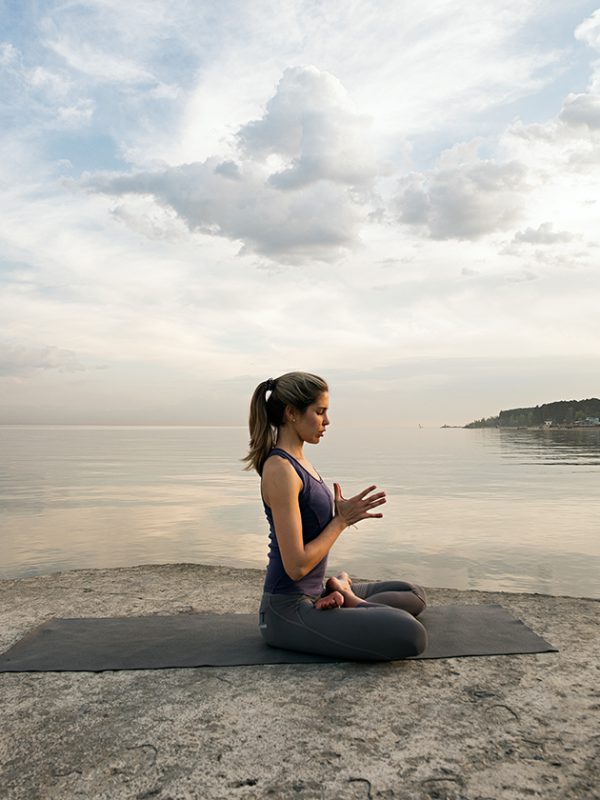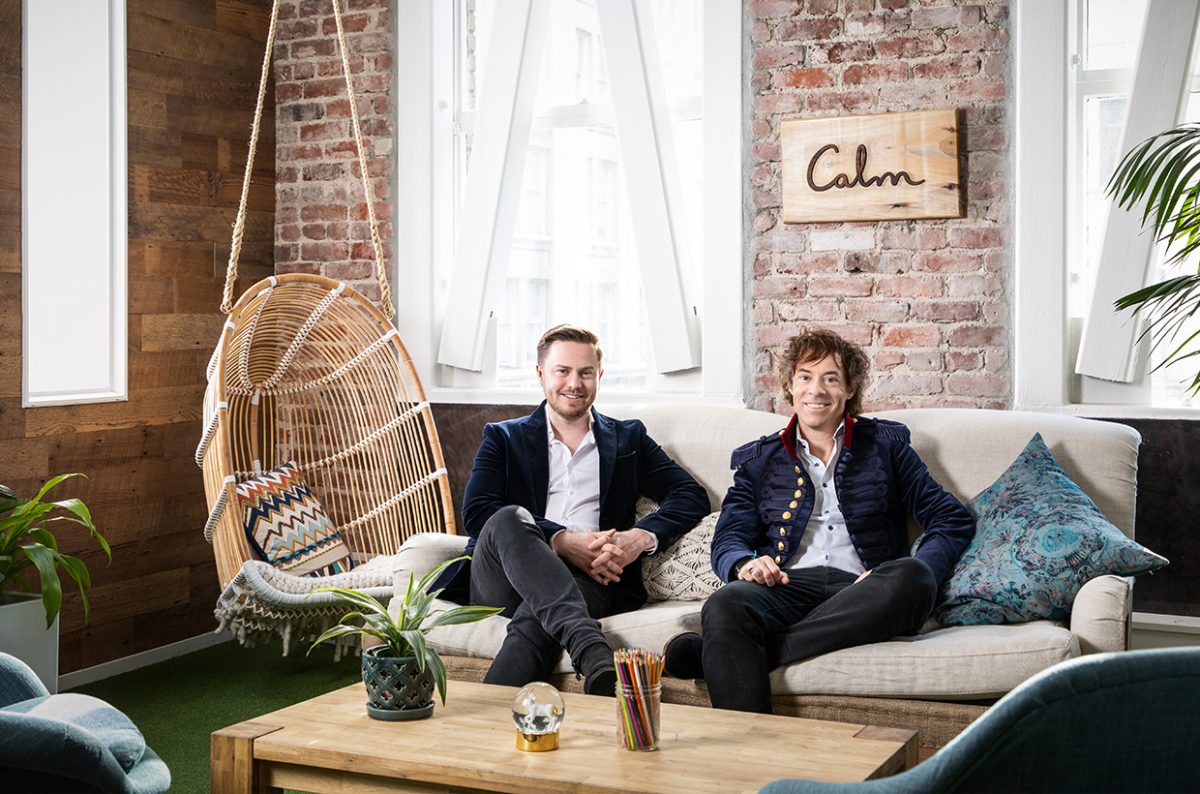Calm App by Jutta von Campenhausen | 4th December, 2020 | Personalities
A red carpet outside a movie theatre on London’s Leicester Square, TV presenters in evening dress, audience members lining up, while the stars are on all fours – because they’re sheep. The premiere of the world’s dullest movie was a perfect PR stunt.
Michael Acton Smith and Alex Tew, cofounders of the Calm meditation app, produced the movie Baa Baa Land to help people doze off. Eight hours of grazing sheep in slow motion –no lines, no plot. The media loved the bizarre spectacle with a serious message. “Insomnia is a common condition. This film could be the cure,” Michael Acton Smith said, looking directly into the cameras. “In a world of constant stress and information overload, of anxious days and restless nights, comes the chance at last to sit and stare at sheep, because sleep is the key to mental fitness.”
And indeed, the Calm online platform offers a lot more than boring films. Guided meditations are at the core of what the company does. Every day the platform uploads a new Daily Calm meditation, which is designed to help both beginners and experienced practitioners reflect for ten minutes. In addition to this, Calm also offers breathing exercises, calming music and stories that help with falling asleep. To date, the app has received more than half a million five-star reviews on the App Store and Google Play. In 2017, Calm was named iPhone app of the year.
When the two Britons, Tew and Acton Smith, founded the company in 2012, they had learned the hard way that you had to strike the right note. After half a year as an investment banker, Acton Smith founded an online retailer and the Moshi Monsters game, which made him rich – until the figures plummeted dramatically four years later.
“It was a really scary time. We had to lay off hundreds of people and lost the money that friends and family members had invested. I had headaches all the time, lots of stress and was as close to burnout as I’ve ever been,” Acton Smith told a group of college students. It was a painful experience
“Why don’t you try meditation?” he was asked by Alex Tew, his roommate at the time, who had been practicing meditation since he was a teenager. “Why don’t you try leaving me alone?,” Acton Smith responded and went on his first vacation in years, on his own, taking a pile of books on mindfulness and meditation with him. He read up on the latest discoveries in neuroscience, on focusing one’s mind, on resilience and on happiness. It dawned on him that meditating was much more than a dreamlike retreat from the world. Soon, the two London roommates pondered how they could create a successful meditation app.
Alex Tew, now 36, also lived through the highs and lows of internet entrepreneurship. As early as 2005, he had created a website that provided guided meditations, but the idea failed to generate any interest among would-be investors. This although Tew had developed the Million Dollar Homepage in order to finance his studies. It was a website that was empty except for one million pixels, which he sold for a dollar each in the space of four months. It turned him into a young millionaire and internet celebrity – at least temporarily. A spin-off called Pixelotto failed, as did his One Million People book project.
But then Tew and Acton Smith invented Calm. “We loved the name and we loved the idea of helping people relax,” Acton Smith has said. “But we didn’t know how to disassociate meditation from the weird and woo-woo,” he added. On the other hand, he and Tew saw plant-based diets – previously dismissed as eco-nonsense – grow into a multimillion dollar industry. They realized that mental health would become an issue that would keep growing in importance.
In the end, the two Britons redefined the target market for their company – mental fitness – and decided to turn it into “the Nike for the mind.” They moved to Silicon Valley in California and launched Calm in 2012 after generating 1.5 million dollars in capital from business angels in several rounds. Funds for the development of the app were tight, with nothing left over for advertising. At the time, meditation platforms were seen as neither novel nor interesting but rather weird and niche.
”In a world of constant stress and information overload … comes the chance at last to pause, to breathe, to calm our racing minds.“ MICHAEL ACTON SMITH
Three years later, Calm’s annual turnover had grown to around 2.3 million dollars. The app was making a profit. Until 2016, the two ran it quietly and steadily. Then they became aware of the fact that most users were not opening the app until quite late at night. So they created Sleep Stories for adults, narrated by well-known personalities and breathtakingly sleep-inducing.
In 2017, Sleep Stories helped Calm’s turnover shoot up to 22 million dollars. In the following year, the company attracted Series A investments of 27 million, with a further 88 million coming in from the Series B round. Calm became the first mental health unicorn, a privately held startup valued at more than a billion dollars.
Today, the two entrepreneurs regularly give lectures about creating startups to college students. It’s always about big dreams, hard work and taking risks by doing things their own way and daring to leave gaps. “Done is better than perfect,” Acton Smith says. The 46-year-old adds: “It’s like surfing, you have to be there before the wave breaks.” In the end, the wave was enormous. Today, there are 1,300 meditation apps, with two top dogs among them: Calm and Headspace. Calm has been downloaded 30 million times and adds 75,000 new users globally every day.
”Your mind is a muscle. Let’s flex it!“ from calm’s Mental Fitness program
The secret of sustained success is not just getting new users to sign up, but to hold on to existing ones long-term. Calm now features an advanced meditation series, the so-called master classes. It also addresses issues like healthy eating, self-esteem, anxiety, stress, communication, relationships and crisis management. It is worth exploring the app and the website, which now feature free online magazines and a mindfulness calendar, blogs and scientific background information, even an extensive kid’s corner.
Right in line with the Time Well Spent movement, Calm advocates purposely taking time off from your smartphone and computer. The app does not send any push notifications and works best purely as a source of audio. The screen only shows a quiet lake in front of snow-covered mountains and blue skies. The magazines with features on meditation, sleep and personal transformation are meant to be downloaded, printed out and read in a quiet place. For those that would like more, two books – Calm and The Magic of Sleep: A Bedside Companion – have already been published. Calm may soon be changing from a purely virtual space to one that is also physical. “Michael is thinking about a resort,” Alex Tew says. “He’d like to buy a quiet island.”






